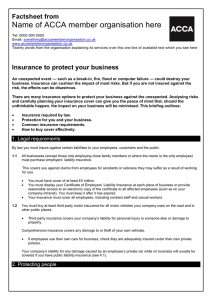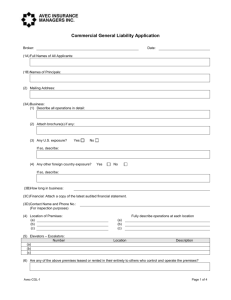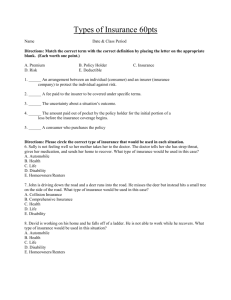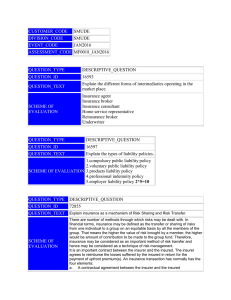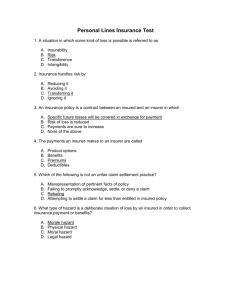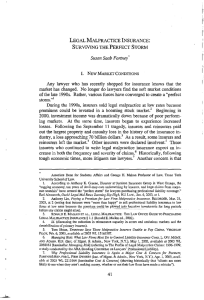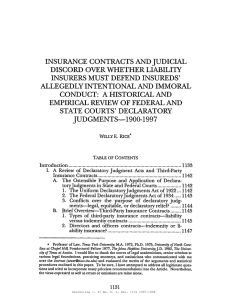Insurance Optional cover
advertisement
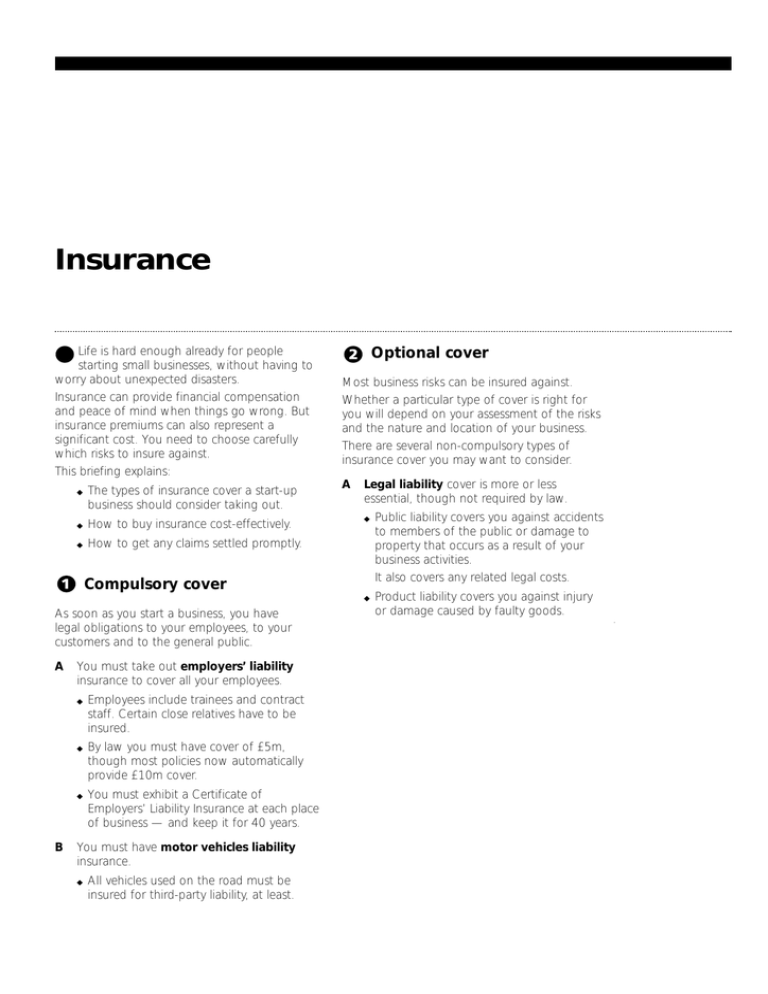
Insurance Life is hard enough already for people starting small businesses, without having to worry about unexpected disasters. Insurance can provide financial compensation and peace of mind when things go wrong. But insurance premiums can also represent a significant cost. You need to choose carefully which risks to insure against. This briefing explains: ◆ The types of insurance cover a start-up business should consider taking out. ◆ How to buy insurance cost-effectively. ◆ How to get any claims settled promptly. Optional cover Most business risks can be insured against. Whether a particular type of cover is right for you will depend on your assessment of the risks and the nature and location of your business. There are several non-compulsory types of insurance cover you may want to consider. A Legal liability cover is more or less essential, though not required by law. ◆ Public liability covers you against accidents to members of the public or damage to property that occurs as a result of your business activities. It also covers any related legal costs. ◆ Product liability covers you against injury or damage caused by faulty goods. Compulsory cover As soon as you start a business, you have legal obligations to your employees, to your customers and to the general public. A You must take out employers’ liability insurance to cover all your employees. B ◆ Employees include trainees and contract staff. Certain close relatives have to be insured. ◆ By law you must have cover of £5m, though most policies now automatically provide £10m cover. ◆ You must exhibit a Certificate of Employers’ Liability Insurance at each place of business — and keep it for 40 years. You must have motor vehicles liability insurance. ◆ All vehicles used on the road must be insured for third-party liability, at least. whenever it is left unoccupied. Insurers will require you to show evidence of forcible or violent entry or exit before paying a claim. This can be important if you manufacture, repair, install or even retail goods. Legal liability insurance only covers you if you are legally liable for the injury or damage. B Property cover can be provided for specific risks (eg fire or flood) or, alternatively, for a wide range of risks in one package. Theft by employees is generally not covered, though this can be arranged through a separate ‘fidelity’ policy. D Professional indemnity cover protects you against your legal liability for losses suffered by your customers as a result of your negligent advice. ◆ You should cover your contents, stock and fixtures. If you own your premises, you will need to insure the buildings too. ◆ Claims for wear and tear and gradual deterioration are generally excluded. If you arrange cover on a ‘new for old’ basis, deductions for wear and tear will not be made from claims for risks which are insured, such as fire or theft. ◆ This insurance is legally required in certain professions, such as the law, accountancy and financial services. ◆ It is common in other areas, such as management and computer consultancy, publishing, engineering and design. Most policies automatically insure you for up to £100,000 against terrorist attack. You will need to arrange extra insurance if your property and possessions exceed this replacement cost. Do you give any advice which could make you liable? ◆ ◆ C ◆ E If you rent premises, ask to see the landlord’s insurance policy and check the range of protection that is in place. This is also known as ‘consequential loss’ insurance. Cover against theft by outsiders may be something you could leave for later, if your business does not involve expensive equipment or stock. ◆ Insurers generally want to see a reasonable minimum standard of security. ◆ Make sure that your property is locked Growing pains Business interruption insurance (see box) compensates you for extra costs incurred and trading profits lost if your business suffers serious disruption after, say, a fire. F ◆ For example, a manufacturer might have to stop trading for six months while premises were rebuilt and re-equipped. ◆ A travel agency that lost all its customer files and bookings might lose three months’ sales as a consequence. Legal expenses insurance covers legal costs such as solicitors’ fees and court costs. ◆ The last thing Curtis Pearson wanted to spend time thinking about was the risk to his newly-launched distribution business from unexpected disasters. To put his mind at ease, he took out comprehensive insurance with a reputable and old-established company — and then got down to the serious business of building up sales. The next year he renewed his insurance without stopping to think whether his needs had changed. When his warehouse burned down, six months later, his only consolation was knowing that he was fully insured. But when his claim for £150,000 to cover business interruption was queried, Curtis began to realise his mistake. He had never told his insurer how much his turnover had grown. By the time payment was agreed — only £70,000, because of the underinsurance — his cashflow had been stretched too far. He was forced to sell up at a knockdown price. Many policies offer legal guidance via a telephone helpline. G You can use insurance to make your business less vulnerable to the illness or death of key employees. Small businesses are often dependent on one or two key members of staff. ◆ ‘Key man’ insurance pays out in the event of the death of a nominated employee. ◆ Income protection insurance schemes can be used to cover employees in the event of long-term sickness, paying their salaries during the period of incapacity. This relieves the business of the burden of paying for a sick employee. H Other, more specialised, insurance policies are available to provide cover for particular business situations. ◆ Money policies cover you for loss of cash or cheques. Shops that hold large amounts of cash will page 2 specialist broker in this field is Tolson Messenger (0845 601 4527 or www.tolsonmessenger.co.uk). need specially agreed limits. ◆ ‘Goods in transit’ cover may be important if your products spend a long time in delivery vans or are especially vulnerable. Hauliers’ terms of trade usually place strict (and low) limits on the compensation they will pay. ◆ Glass cover may be necessary for shop windows or any other fixed glass. ◆ Different types of engineering policy are available for machinery, sometimes including both breakdown and statutory inspection cover. You may need to check that equipment that is used off-site is included. ◆ Credit insurance can compensate for debtors who are unable to pay you. ◆ Computer policies may cover you for breakdowns and for loss of information. ◆ Private health policies may cover the costs of private medical treatment or pay a lump sum in the event of a ‘critical illness’. Choosing an insurer A Disputes in insurance can and do happen. Claims can be paid late, or not in full, or not at all. ◆ B Home workers’ insurance A growing number of start-up businesses begin life in people’s homes. Shop around for advice and quotes. ◆ Insurance brokers’ services are usually free. A good broker will search the market to obtain the best deal for you. Talk to insurance brokers or consultants who have experience of small businesses. ◆ Banks and building societies can offer good value, but may be tied to selling insurance policies from just one company. ◆ Get at least three quotes, to ensure you are being offered a competitive rate. ◆ Be wary of cheap deals. Why are they cheap? What is not being insured? A Do not rely on your household insurance. ◆ B C Ordinary household insurance policies will not usually cover business risks such as employers’, public, or product liability. Personal recommendation is often the best way to find a good adviser. Ask around. If you start working from home or using your car for business, your household and motor insurance may be invalidated. Special ‘working from home’ policy packages start at about £125 per year. ◆ These can be arranged through many insurers and brokers, but the leading Low priority Matthew Mor’s design company was always busy meeting customers’ deadlines. Cash was tight, so Matthew chose the cheapest insurance policy he could find and then returned to his priority deadlines. When burglars subsequently stole all 12 of the company’s computers, the consequences were appalling. After a month of unsatisfactory negotiations, the insurer paid for the computers, but nothing else. Meanwhile, all the work in progress had been lost, customers had deserted and the business was in ruins. Matthew learnt the true cost of inadequate insurance the hard way. All insurance companies should be authorised by the Insurance and Friendly Societies Division of the Financial Services Authority (FSA). Most are members of the Association of British Insurers. Check an insurer is authorised by calling the FSA’s enquiry line (0845 606 1234) or visiting the website (www.fsa.gov.uk). How much cover? Take time to think clearly about the amount of cover you need. Overinsurance is a constant financial drain on your resources, while underinsurance can be fatal to your business. A There are several principles to bear in mind when deciding how much cover to buy. B ◆ Buildings should be insured for their full rebuilding cost (not forgetting professional fees and the cost of site clearance) and not their market value. If your buildings are leased, check that the landlord has this type of cover in place. ◆ Insure stock for its replacement cost price, without any addition for profit. ◆ Plant and machinery should normally be insured on a ‘replacement as new’ basis. If you pay for too little cover, the insurance company is entitled to reduce any claim by the percentage of underinsurance. page 3 ◆ For example, suppose you insure your property, which has a full rebuilding cost of £75,000, for only £50,000. The insurer can reduce any claim you make by the same proportion — ie if you claimed for a genuine £3,000-worth of damage, you would only receive £2,000. Often the cover the policyholder thinks has been bought is not exactly the same as the cover provided. ◆ E This does not work in reverse. If you pay for more cover than you need, you are simply giving money away. C ◆ Make sure the excess on your policy is an appropriate amount. ◆ You can often negotiate a big reduction in premiums by agreeing to a higher excess. ◆ If most of your claims are falling beneath the excess threshold, it may be sensible to switch to a policy with a lower excess. But it will cost you more, of course. ◆ You may want to avoid making claims just above the excess, if they would lead to increased premiums in subsequent years. If you have to make a claim, following a methodical procedure will ensure it is settled with a minimum of delay. A Ask your insurer for a claim form. ◆ B C Taking out a policy A Select cover that matches your needs. ◆ A combined policy, covering a suitable range of risks, is usually the best solution. ◆ Policies can be tailored to the requirements of an individual business. When filling in the proposal form, disclose anything that might be relevant, even if it is not specifically asked for. ◆ C Failure to disclose relevant facts might lead the insurer to treat your policy as invalid. Insurers may demand improvements to the security of the premises before giving cover. For example, they may insist on a particular type of lock or quality of burglar alarm. ◆ If you have a burglar alarm fitted by an approved installer, you may get a discount. Check that the fitters and the alarm system are acceptable to your insurers. D Once your proposal form is accepted, you will receive a policy. ◆ Read the policy document and make a note of any special conditions or exclusions (such as precautions to be taken when transporting cash). It is up to you to make sure the policy is renewed on time, though insurance companies usually warn you. Making a claim D Some policies allow you to pay a lower annual premium for your cover if you build up a no-claims bonus over several years. B Make a note of the policy renewal date. Most insurance policies require the insured to pay an ‘excess’ or ‘deductible’, covering the first part of any loss. ◆ Keep a copy of the policy (or at least the main details), somewhere off the premises. You may already have a form, in the pack with your policy documents. Return the claim form, with at least two or three estimates for the work to be done. ◆ Some policies require that claims are made within a stated number of days. ◆ Provide documentation (eg receipts and photographs) to support your claim. Explain all the relevant circumstances surrounding the claim. ◆ If an insurer discovers material facts have been held back, it can damage your claim. D Wait for the insurance company’s go-ahead before starting the work. ◆ You may be given permission by phone to get urgent work done straight away (eg making the premises weathertight). Ask for confirmation in writing. E The insurance company may send a loss adjuster (an independent expert, paid for by the insurer) to check the damage or loss. F You can employ your own independent expert — a loss assessor — who will charge a fee, which you should agree beforehand. ◆ A loss assessor needs to be involved from the very beginning. It is too late to engage one once you have received an offer from the insurer. ◆ If you are using an insurance broker, resolving and settling claims is part of the service the broker should provide, at no extra cost to you. Keep file copies of all correspondence relating to the claim and detailed, dated records of all telephone conversations. page 4
